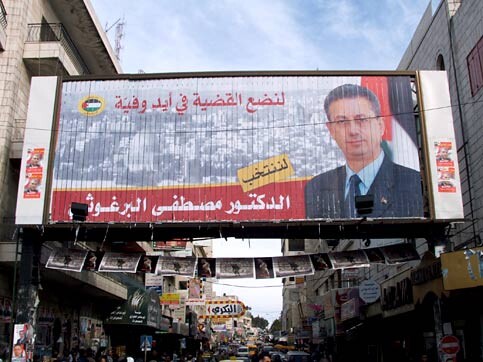
An election poster for Palestinian presidential candidate Mohammed Abbas in Ramallah. (Maureen Clare Murphy)
We should have known that Gaza would be closed. However, someone told us that the border might be open and that we would be able to pass. Together with a colleague, who is also an accredited elections observer, we left the West Bank this morning to go to Gaza.
Yesterday, Israeli forces killed seven Palestinians, most of the same family, when they fired a tank shell into an agricultural area in the area of Beit Lahia in the northern part of the Gaza Strip. The tank shell killed three brothers, Bisam (13), Mahmoud (14) and Hani (16), three cousins, Rajigh (10), Jabir (12) and Mohammad (22) and their neighbour Jabril. Eight others were wounded. At the time of the shelling, they were working in greenhouses. At the time we left, two were in serious condition.
When we arrived near Erez checkpoint, still some two to three hundred meters away from the parking place at the enormous terminal dividing Israel from the Gaza Strip, we were stopped by Israeli soldiers and police. “It might take two hours, or ten,” the police officer said. “They just tell us to stop everyone, until they finish [sic] their job.”
We decided to wait for a couple of minutes, and called some friends in Gaza City, but things were unclear. “They killed two Palestinians,” a guy in a taxi said. Some news outlets reported that Israeli fire “apparently came in response to Palestinian mortar attacks,” without reporting that since Christmas, there have been 25 Palestinians killed, most of them in Gaza.
Despite continued Israeli military operations in the Gaza Strip, the talk of the country remains the elections. Posters can be seen everywhere, including on the Wall.
Taxi drivers have stickers on their windows, big advertising billboards bear the faces of candidates — many juxtaposed next to the late Palestinian president Yasser Arafat. Talking to ordinary people, everyone expects Mahmoud Abbas to win, because “there are no other candidates”. Some talk about Mustafa Barghouti, but the latest polls give him just 20 percent.

An election poster for Palestinian presidential candidate Mustafa Barghouti in Ramallah. (Maureen Clare Murphy)
“What can we choose from?” an old man said, “either we choose America’s man or we choose Europe’s man.” Despite some hesitance, people are excited about the elections and believe that they are important. “Of course, most people are more interested in parliamentary elections than the local elections,” another taxi passenger said.
In East Jerusalem, Palestinians are less enthusiastic. Palestinian local monitors talk about the post offices, where Palestinians might vote, but fear a strike by employees. Others are afraid to vote, because they are worried they will lose their Jerusalem identity cards and benefits in the town. Today, most of the hundreds of international observers arrived. Local election observers say that they need even more. A member of the coordination team of local monitors said: “We need observers at each polling station to guarantee that the elections are fair, and we need observers at each checkpoint to see whether the elections are free.” He said that he expects the elections to be fair but not free.
Related Links
Arjan El Fassed is a co-founder of The Electronic Intifada and a member of UCP’s election mission, accredited as international election observers.





